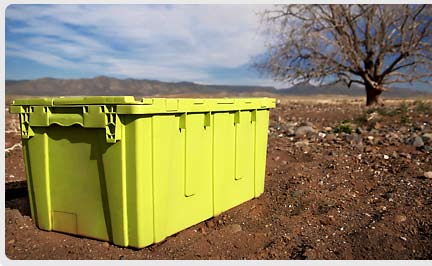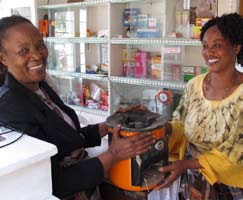
Moved lately? Frustrated by spending hundreds of dollars for boxes that are simply thrown out weeks later? Recopack has the answer for you. Recopack is the recycled eco-packaging solution. Spencer Brown, an enviro-innovator, uses recycled plastics to create recyclable boxes that are rented for two weeks at a time. The boxes are delivered and picked up at no additional charge and can save movers 50 percent on the costs of traditional cardboard boxes in their boxing needs. Recopacks maintain their integrity for up to 400 round trips before they are ground up and reformed into more boxes.
While Recopacks are an innovative product that meets the desires of many consumers, whether they are greener than the cardboard alternative depends on the goal of being green. Use of Recopacks reduces landfill waste and the need for increased cardboard production. Trees, however, are a renewable resource and are grown to meet the demand for timber products. And rather than send the cardboard waste to the landfill, the Recopack requires its own transportation and cleaning, which has its own environmental impacts. There are many shades of green.
For more information: www.rentagreenbox.com

When it comes to home heating and cooling, do you embrace the keep-it-constant method or are you the turn-it-up/turn-it-down type? While there are some rather sophisticated home heating systems on the market, most of us use the standard thermostat and adjust it occasionally (or often) to meet our comfort level.
Tony Fadell, an innovator, has helped create a better way. Fadell and associates recently introduced the Nest Learning Thermostat—a smart thermostat. Fadell helped develop the iPod and the iPhone. He is one of those entrepreneurs that knows how to improve existing technologies and, as a result, make them greener.
The Nest is similar to most household thermostats, but smarter. It learns from your daily adjustments and creates an automatic schedule to match your personal preferences. Or, if you prefer, you can adjust the thermostat remotely from the Nest’s mobile app. The Auto Away feature can sense human presence in the room and adjust the temperature accordingly. It’s a family “energy partner” making use of the latest technology to improve energy efficiency.
About nine percent of the energy consumed in the United States is controlled by residential thermostats. The idea that programmable and “smart” thermostats could save energy seems like a no brainer. Studies show, however, that their “greenness” relies on the user. To realize energy savings occupants must program the device to use less energy, such as lowering night or daytime temperatures. Evidence demonstrates that little or no significant savings have resulted from the array of programmable thermostats available. Whether that is due to misuse or comfort over cost is unsettled.
For more information: www.nest.com

Acute respiratory infections are the number one cause of death in developing countries, killing more than 4 million people annually. Nearly 2 million of those deaths are the result of indoor air pollution, a consequence of burning biomass for heating and cooking, the method used by over half of the world’s population.
Envirofit, as the name implies, creates products that fit the needs of the masses while improving the environment. Developing and manufacturing clean burning, efficient, and affordable cook stoves are an example. Founded in 2003, the company’s mission is “to create products that reduce pollution and energy dependence while yielding health, environmental, and economic improvements.”
With more than 450,000 stoves now in use, the company estimates that two-million people are breathing cleaner air, emitting less carbon, and harvesting less wood from the forest. Envirofit stoves use 60 percent less fuel than a standard cook stove, emit 80 percent less carbon, and cost around $25.
Just as important are their global partners that help produce and distribute stoves in Asia, Africa, and, soon, Latin America. With multiple stove types, Envirofit strives to customize products that meet the needs of consumers worldwide. Envirofit also takes manufacturing to local markets, with plants in China and India and new developments starting in Kenya and Ghana.
Staying aware of market behavior is key for the company to ensure that products fit the needs of consumers and the environment. Products such as clean, efficient cook stoves are important because, according to Envirofit, the problem of indoor air pollution is “too large to be tackled via subsidy or give-away programs. A true market-based solution is needed.”
For more information: www.envirofit.org



